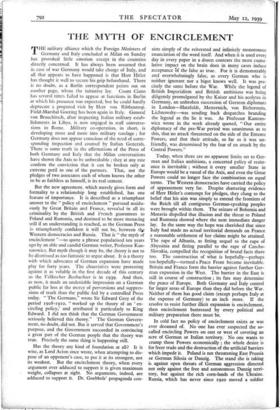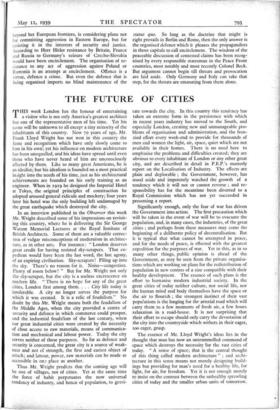THE MYTH OF ENCIRCLEMENT
Tmilitary alliance which the Foreign Ministers of Germany and Italy concluded at Milan on Sunday has provoked little emotion except in the countries directly concerned. It has always been assumed that in case of war Germany would take charge of Italy, and all that appears to have happened is that Herr Hitler has thought it well to secure his grip beforehand. There is no doubt, as a Berlin correspondent points out on another page, where the initiative lay. Count Ciano has several times failed to appear at functions in Berlin at which his presence was expected, but he could hardly deprecate a proposed visit by Herr von Ribbentrop. Field-Marshal Goering has been again in Italy. General von Brauchitsch, after inspecting Italian military estab- lishments in Libya, is now engaged in staff conversa- tions in Rome. Military co-operation, in short, is developing more and more into military tutelage ; for Germany does not appear conscious of the need of corre- sponding inspection and counsel by Italian Generals. There is some truth in the affirmations of the Press of both Germany and Italy that the Milan conversations have shown the Axis to be unbreakable ; they at any rate confirm the conviction that it can be broken only at extreme peril to one of the partners. That, not the pledges of two associates each of whom knows the other to be as faithless as himself, is its real cement.
But the new agreement, which merely gives form and formality to a relationship long established, has one feature of importance. It is described as a triumphant answer to the " policy of encirclement " pursued assidu- ously by Great Britain and France, revealed in all its criminality by the British and French guarantees to Poland and Rumania, and destined to be more menacing still if an understanding is reached, as the German Press is triumphantly confident it will not be, between tlig Western democracies and Russia. That is " the myth of encirclement "—to quote a phrase popularised ten years ago by an able and candid German writer, Professor Kan- torowicz. But myth though it may be, the theory is not to be dismissed as too fantastic to argue about. It is a theory with which advocates of German expansion have made play for forty years. The chauvinists were protesting against it as volubly in the first decade of this century as the V olkischer Beobachter is in 1939. And then, as now, it made an undeniable impression on a German public far less at the mercy of perversions and suppres- sions of truth than the public fed by a controlled Press today. " The Germans," wrote Sir Edward Grey of the period 1908-1910, " worked up the theory of an ' en- circling policy,' and attributed it particularly to King Edward. I did not think that the German Government seriously believed this theory." The German Govern- ment, no doubt, did not. But it served that Government's purpose, and the Government succeeded in convincing a great part of the German people that the theory was true. Precisely the same thing is happening still.
Has the theory any kind of foundation at all? It is wise, as Lord Acton once wrote, when attempting to dis- pose of an opponent's case, to put it at its strongest, not its weakest. But the encirclement theory, when every argument ever adduced to support it is given maximum weight, collapses at sight. No arguments, indeed, are adduced to support it. Dr. Goebbels' propaganda con-
sists simply of the reiterated and infinitely monotonous enunciation of the word itself. And when it is used every day in every paper in a dozen contexts the mere cumu- lative impact on the brain does in many cases induce acceptance Of the false as true. For it is demonstrably and overwhelmingly false, as every German who is neither ignorant nor a bigot knows well. It was pre- cisely the same before the War. While the legend of British Imperialism and British ambitions was being diligently promulgated by the Kaiser and his acolytes in Germany, an unbroken succession of German diplomats in London—Hatzfeldt, Metternich, von Bieberstein, Lichnowsky—was sending back despatches branding the legend as the lie it was. As Professor Kantoro- wicz wrote in the work already quoted, " Our entire diplomacy of the pre-War period was unanimous as to this, that no attack threatened on the side of the Entente Powers, and that their attitude, so far as it was un- friendly, was determined by the fear of an attack by the Central Powers."
Today, when there are no apparent limits set to Ger- man and Italian ambitions, a concerted policy of resist- ance is inevitable ; without it every smaller State in Europe would be a vassal of the Axis, and even the Great Powers could no longer face the combination on equal terms. The Western democracies have carried the policy of appeasement very far. Despite shattering evidence of Herr Hitler's contempt for pledges, they clung to the belief that his aim was simply to extend the frontiers of the Reich till all contiguous German-speaking peoples were brought within them. The seizure of Bohemia and Moravia dispelled that illusion and the threat to Poland and Rumania showed where the next immediate danger lay. In the same way the hope was cherished that since Italy had made no actual territorial demands on France a reasonable settlement of her claims might be attained. The rape of Albania, as fitting sequel to the rape of Abyssinia and fitting parallel to the rape of Czecho- Slovakia, compelled the recognition of brutal facts there too. The construction of what is hopefully—perhaps too hopefully—termed a Peace Front became inevitable. Britain and France form the barrier against further Ger- man expansion in the West. The barrier in the East is still in course of construction ; its fate may determine the peace of Europe. Both Germany and Italy control far larger areas of Europe than they did before the War. Neither of them has good claim (except perhaps Italy at the expense of Germany) to an inch more. If the resolve to resist further illicit expansion is encirclement, then encirclement buttressed by every political and military preparation there must be.
In cold fact no policy of encirclement exists or was ever dreamed of. No one has ever suspected the so- called encircling Powers on east or west of coveting an acre of German or Italian territory. No one wants to cramp these Powers economically ; the whole desire is for freer trade and the destruction of the artificial barriers which impede it. Poland is not threatening East Prussia or German Silesia or Danzig. The stand she is taking is against open threats of German aggression directed not only against the free and autonomous Danzig terri- tory, but against the rich corn-lands of the Ukraine. Russia, which has never since 1920 moved a soldier beyond her European frontiers, is considering plans not for committing aggression in Eastern Europe, but for resisting it in the interests of security and justice. According to Herr Hitler resistance by Britain, France and Russia to Germany's seizure of Czecho-Slovakia would have been encirclement. The organisation of re- sistance to any act of aggression against Poland or Rumania is an attempt at encirclement. Offence is a virtue, defence a crime. But even the defence that is being organised imports no blind maintenance of the status quo. So long as the doctrine that might is right prevails in Berlin and Rome, then the only answer is the organised defence which it pleases the propagandists in those capitals to call encirclement. The wisdom of the peaceable discussion of contested claims has been recog- nised by every responsible statesman in the Peace Front countries, most notably and most recently Colonel Beck. But argument cannot begin till threats and provocation are laid aside. Only Germany and Italy can take that step, for the threats are emanating from them alone.



















































 Previous page
Previous page